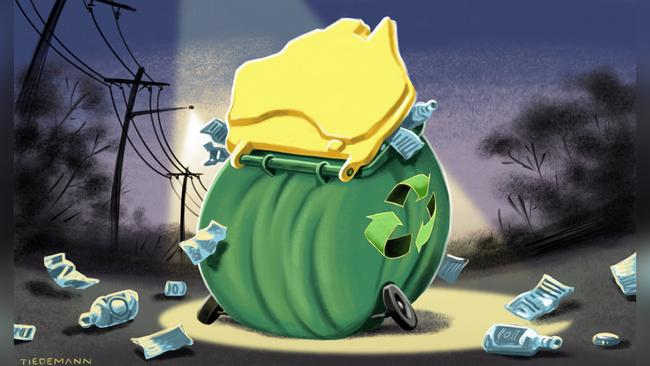
On the rare occasions we had soft drink, my sister and I would race down to the local milk bar to receive the small deposit (was it threepence?) that was attached to the purchase of that bottle of Tarax lemonade.
I recount those days to make the contrast with today’s debate about recycling and the mess in which we find ourselves. Then we were talking about re-use — not recycling. It was small-scale and it was local.
Bottles weren’t smashed to be recycled. They were thoroughly washed and re-used. For various reasons, the re-use option has largely disappeared. What we are debating today is quite different.
The critical issues in the recycling debate are its high cost (collection, sorting, energy) and the absence of profitable markets for most recycled products. The combination of these factors, plus the effective refusal of China and other Asian countries to take waste, means there are no easy solutions to what is fast becoming a disaster.
For example, in 2016-17, almost 13 million tonnes of waste was generated in Victoria. At least one-third went to landfill. The rest was recovered or collected for recycling. No one can be sure what happened to this portion because the government agency, Sustainability Victoria, has dropped the ball on reliable data collection.
In a recent report by the Victorian Auditor-General, Recovering and Reprocessing Resources from Waste, a damning picture emerges of government agencies failing to meet their core objectives while ignoring the implications of the creeping ban around Asia on the import of waste since 2013.
It is increasingly common for waste to be sent to landfill or stockpiled. These stockpiles pose serious safety and environmental risks. There was a fire at a recycling plant in Coolaroo operated by recycling firm SKM, which is now in liquidation.
There are more than 700 shipping containers of recycled material hanging around the Port of Melbourne that can no longer be shipped overseas. The company that ordered the transportation of the material was none other than SKM. Needless to say, the transport company has not been paid.
Scott Morrison’s achieved agreement at last week’s Council of Australian Governments meeting that the nation would no longer export its waste was essentially for show. The receiving countries had made it clear that previous practices will no longer apply, effectively forcing this outcome on every state and territory.
The dilemma is how state and territory governments deal with this without imposing undue costs and burdens on their citizens. There is a tremendous amount of fuzzy thinking and sloganeering, including the development of a so-called circular economy.
In Victoria, there are self-interested calls for the introduction of a container deposit scheme along the lines of other states. Environment Minister Lily D’Ambrosio made the first sensible decision of her ministerial career by declaring that such a scheme was not the “answer to kerbside recycling”.
Not only has the Productivity Commission assessed the costs of these schemes to outweigh their benefits, but the experience of NSW points to very significant implementation problems that are costly to rectify.
Moreover, the diversion of used aluminium cans, the only recycled product that produces a serious economic return, away from kerbside recycling will further undermine the latter.
Mind you, D’Ambrosio has been sitting on a Sustainability Fund of more than $500 million amassed through landfill levies. It would seem the Victorian Treasurer would rather retain this fund on the asset side of the state’s balance sheet than see it used for the purposes it was collected. These include “fostering environmentally sustainable use of resources and best practices in waste management”.
Scepticism should be applied when assessing the contributions of many in this industry. They will always make big environmental claims while seeking the assistance of taxpayers and ratepayers.
Consider this quote from one consultant: “Industry is very supportive of a positive procurement policy where government and businesses preferentially purchase recycled content. Part of the solution is positive procurement and part of the solution is infrastructure, but industry can’t and won’t invest in new technologies unless there’s an economic return. At the moment, they are outcompeted by cheap landfill.” What he is really saying is that the industry requires regulatory assistance along with government subsidies.
Another suggestion is to force households to further sort and wash their recycled material, including separating soft and hard plastic. This will involve extra containers, despite many people living in very small premises that would rule out this option. More waste management education is on the cards, including exhortations to minimise waste creation.
One sensible policy option in Victoria that was raised only briefly, then rejected, was the burning of waste material in purpose-built incinerators with scrubbers installed. This option would also generate electricity that could provide valuable back-up power to renewable energy sources.
This is common in Sweden and Japan. Indeed, Sweden imports waste for this purpose. Burning waste generates carbon dioxide but then landfills generate methane, a more toxic greenhouse gas. That said, best-practice landfills will also be part of the solution.
The bottom line is that recycling is imposed people-management, with the message being that we are all contributing to saving the planet by diligently sorting our rubbish. The reality has always been markedly different from this message and it is getting worse.
Waste for recycling must be collected, sorted and sent on for recovery or reprocessing. The entire cycle is itself costly and energy-intensive, something that must be taken into account when considering policy options. With the rising price of electricity and the withdrawal of those previously helpful receiving countries, there are no easy solutions to this serious public policy problem.




I am old enough to remember milk being delivered each morning in glass bottles. We would eagerly drink it and mum would wash the bottles, ready to be collected the next day and replaced with full ones.